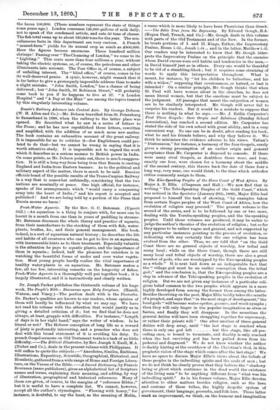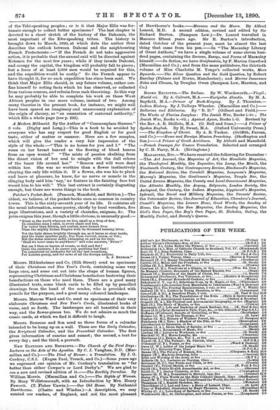The Rive - Speaking Peoples of the Slave Coast of West Africa.
By Major A. B. Ellis. (Chapman and Hall.)—We now find that in writing " The Tshi-Speaking Peoples of the Gold Coast," which was noticed in the Spectator (January 26th, 1889), Major Ellis had proposed to himself the task of showing, " by examples taken from certain Negro peoples of the West Coast of Africa, how the evolution of religion may proceed." The present volume is the second of the aeries, and is to be followed by one or two more, dealing with the Yoruba-speaking peoples, and the Ga-speaking peoples. Until those volumes are produced, it may be unfair to judge the author's theories of the evolution of religion ; but so far they appear to be rather vague and general, and not supported by any particular instances pointing to the process of evolution, or indicating with any certainty that the one religion has been evolved from the other. Thus, we are told that "on the Gold Coast there are no general objects of worship, few tribal and many local ; while on the Slave Coast, though there are still many local and tribal objects of worship, there are also a great number of gods, who are worshipped by the Eke-speaking peoples as a whole." It is next laid down as an indisputable fact that the " village god must be an earlier conception than the tribal god ;" and the conclusion is, that the Eke-speaking peoples are a step in advance of the Tshi-speaking peoples in the evolution of religion. But we are not given any instances of a particular reli- gious belief common to the two peoples which appears in a more highly developed form among the former than among the latter. Besides theorising on the past, Major Ellis boldly takes the mantle of a prophet, and says that " in the nest stage of development," the local gods " will become water-sprites, gnomes, and wood-nymphs ; then they will only linger in the popular imagination as elves or fairies, and finally they will disappear. In the meantime the general deities will have been struggling together for supremacy, or rather their priests will." One after another of these general deities will drop away, until " the last stage is reached when there is only one god left but this stage, like all pre- ceding ones, is bound to terminate, and finality is only reached when the last surviving god has been pulled down from his pedestal and disgraced." We do not know whether the author is darkly hinting at the overthrow of the Christian's God, in this prophetic vision of the stage which comes after the last stage ! We have no space to discuss Major Ellis's views about the beliefs of these peoples in the indwelling spirits and the souls of mon ; but we do not think he clearly proves that they believe the " shadowy being or ghost which continues in the dead world the existence of the living man " to be anything different from " what was his indwelling spirit." As in his former volume, Major Ellis devotes attention to other matters besides religion, such as the laws and customs of these tribes, the highly despotic system of government, their language, proverbs, and folk-lore. These latter mark an improvement, we think, on the humour and imagination of the Tshi-speaking peoples ; or is it that Major Ellis was for- tunate enough to collect better specimens ? The last chapter is devoted to a short sketch of the history of the Dahomis, the most important of the Eke-speaking tribes. The history is brought down to March, 1890, at which date the author thus describes the outlook between Dahomi and the neighbouring French Protectorate :—" If the French do not take aggressive action, it is probable that the annual raid will be directed against Xotonou for the next few years ; while if they invade Dahomi, and occupy the capital, the kingdom will probably fall to pieces ; but a force of at least 2,000 men would be required for this, and the expedition would be costly." So the French appear to have thought it, for no such expedition has since been sent. We think that Major Ellis should, in any future volume, rather con- fine himself to noting facts which he has observed, or collected from various sources, and refrain from rash theorising. In this way he may probably be able to complete his work on these West African peoples in one more volume, instead of two. Among many theories in the present book, for instance, we might well have been spared an imaginary and unnecessary explanation of the origin of slavery, as " an emanation of maternal authority," which fills a whole page (see p. 222).











































 Previous page
Previous page